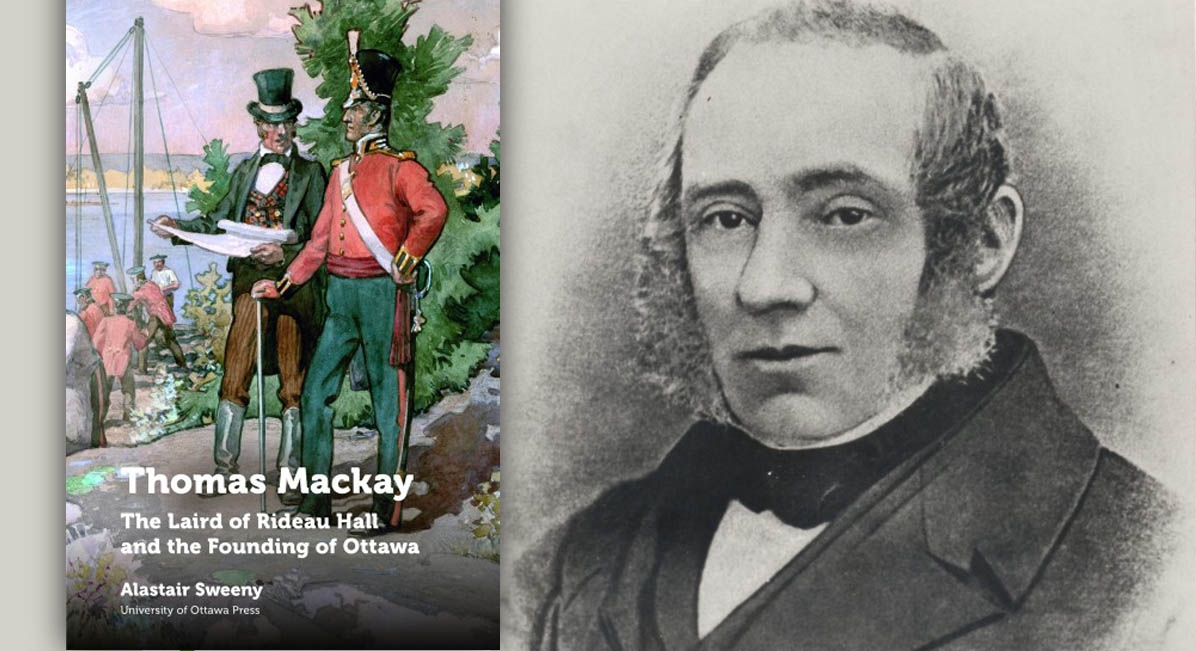
Thomas Mackay: The Most Famous Ottawan no one Knows About
Thomas Mackay: The Laird of Rideau Hall and the Founding of Ottawa
Author: Alastair Sweeny
Publisher: University of Ottawa Press
Paper ISBN: 9780776636788
In 1792, John Graves Simcoe, the Lieutenant Governor of Upper Canada, extended an invitation to American Loyalists to move north and accelerate colonization. Thomas Mackay: The Laird of Rideau Hall and the Founding of Ottawa is a must-read historical account of the Upper and Lower Canadian colonies, chronicling the tales of these settlers and others who perceived a spark of potential in the new territory and endeavoured tirelessly to bring their dreams to fruition.
After the British victories in the American War of 1812 (and their subsequent defeat of Napoleon at Waterloo in 1815), the British government wanted to ensure the security of the colonies from the Americans, who were known allies of the French. They also directed the British Royal Navy to look for alternate sources of timber and hemp for their fleet. These two factors led to the building of infrastructure, namely canals, to facilitate the transport of goods from the interior to Quebec and onto ships bound for England. It also opened safe supply roots to Lower Canada, namely Kingston.
By the time Thomas Mackay reached Montreal in 1817 with his wife and family, Boston native and empire loyalist Philemon Wright and his sons had been moving timber from Wrightstown (now Gatineau, Quebec) down the Ottawa River through the treacherous Lachine Rapids, all the way to Quebec City for over a decade.
Mackay had cut his teeth apprenticing as a stonemason alongside his father in Scotland and quickly found work as a stonemason in Montreal. His work on Fort Lennox for Lord Wellington led to him being asked to bid on the Lachine Canal and then the Rideau Canal.
Thomas Mackay: The Laird of Rideau Hall and the Founding of Ottawa is much more than Thomas Mackay’s life and his vision for Bytown as the capital. Author Alastair Sweeny narrates the tales of Richmond, Scott, By, Bell, Byron, Elgin, Dalhousie, and Wellington—the men behind the names—and their contributions to Bytown.
Then there’s the remarkable story of the “booty” of Spanish silver. Captured by the British Navy during wars against France and Spain, the bullion was held at the citadels in Halifax, Quebec, and an Ordnance depot on Saint-Helen’s Island in Montreal.
Sweeny’s research revealed that the charges brought against Lieutenant-Colonel John By by the British Parliament, alleging cost overruns during the construction of the Rideau Canal, were merely a political manoeuvre. Lieut-Col. By, renowned for his supervision of the canal’s construction, was unjustly accused. It turns out that the Spanish silver bullion covered the canal expenditures.
Lieut-Col. By was called back to England and never received acclaim for his incredible achievements during his lifetime.
Thomas Mackay worked directly with Colonel By. Both men had reputations for being perfectionists while also treating their workers with respect.
Mackay’s achievements are extensive: builder, legislator, militia leader, founding trustee of Queens, founder of New Edinburgh, and the list goes on and on. Sadly, the Mackay name was not passed down in Ottawa. Even though he was father to sixteen children, Mackay and his wife lost all but three of their daughters to diseases and drownings.
However, Thomas Mackay lives on in the craftsmanship of the structures he built almost 200 years ago: the incredible curved locks at the entrance to the Rideau Canal; Ottawa’s oldest stone building, the Bytown Museum (1826), originally built as a supply depot; Rideau Hall, the Mackay family home and an architectural marvel of its time; Earnscliffe, once home to John A Macdonald.
Thomas Mackay: The Laird of Rideau Hall and the Founding of Ottawa is a highly enjoyable read. Sweeney brings the characters to life and enthrals the reader with his passion for the history of Canada’s capital city.
Thomas Mackay: The Laird of Rideau Hall and the Founding of Ottawa is available for sale at the University of Ottawa Press and your favourite Ottawa independent bookstore.












